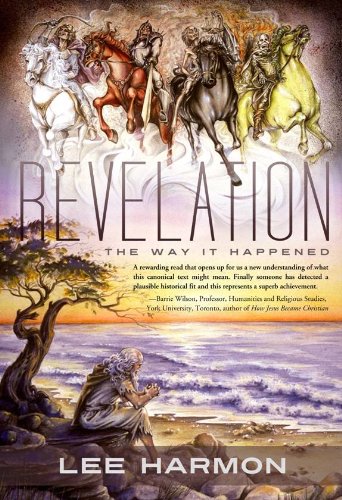Book review: Revelation: The Way It Happened
by Lee Harmon
★★★★
This review comes from Pastor Jeff’s website: http://pastorjeffcma.wordpress.com/2012/06/13/revelation-the-way-it-happened-a-review-or-the-future-isnt-what-it-used-to-be/
*********
There is certainly no book of the Bible that attracts attention like the book of Revelation. People seem either fascinated, frightened, or confused by it–or maybe all of the above. It is commonly said that if you read 25 books on Revelation you would get 26 different opinions and there is probably an element of truth in that.
Revelation, as a work of ancient apocalyptic literature, is a familiar entrance into a very unfamiliar genre of writing. Much of the church has read these many cosmic symbols and cataclysmic events as a figurative description of what will transpire at the end of time climaxing in the second coming of the Lord Jesus Christ. But such a futuristic interpretation, while being widespread, is certainly not the only understanding “out there” even among evangelicals. What about the possibility that the description John gives in his vision is not about what will happen at the end of time, but what did happen shortly after his writing it? In theological terminology this is know as the Preterist view and that is what is presented to us in “Revelation: The Way It Happened” by Lee Harmon.
Even though the author is both theologically liberal along with being an adherent to the Historical Jesus school of thought, thereby having a far different biblical understanding than I would have, I found much to appreciate about this text. Even though he offers a “verse by verse” treatment of the “apocalypse,” do not expect the rather dry & dusty exegesis one might receive from far too many commentaries.
Lee has provided not only a wealth of textual and historical information alongside his own commentary, but we are provided his preterist interpretation through the eyes of a father and son as they live through these “apocalyptic” events. And then as a further aside we find a sprinkling of anecdotes from the likes of Nero himself. All of that to say, that even if you find yourself in theological disagreement, you will simply enjoy reading the book. While a review is no place for a theological debate, I would certainly take issue with some of the book’s conclusions.
My main concerns with the text are twofold. First, while such an historical treatment has much to offer, there are some places which, from a desire for a “perfect” fit I will imagine, the author presses a bit too hard on some of the details. This runs the gamut from some of the cosmic signs to a composite of “Johns” and a few things in between. Secondly, while there are a sprinkling of footnotes throughout the text I would have wished for a greater amount of documentation. While from a historian’s perspective many of the events referenced might be “common knowledge,” that would most likely not be the case for the lay reader.
Let me encourage you to read this very accessible presentation of a subject that is far too often quite inaccessible. The reader will find it to be fun, exciting, and informative. Allow me to make some disclaimers at his point. If you have come from a futurist perspective on Revelation and this is your first exposure to the preterist view allow me to also recommend consulting http://www.ligonier.org/blog/top-5-co… for some other important texts with some similar interpretations. If you likewise are unfamiliar with the futurist interpretation of the book (outside of some sensationalist end-time evangelist) allow me to encourage Robert Mounce’s commentary on Revelation from the NICNT series.
Mr. Harmon has written a book that I can highly recommend to the critical thinker who enjoys the interplay of ideas and conclusions with which he may or may not agree.












 354 Circles
354 Circles
 603 Goodreads Friends & Fans
603 Goodreads Friends & Fans

 Hello! I'm an author, historical Jesus scholar, book reviewer, and liberal Christian, which means I appreciate and attempt to exercise the humanitarian teachings of Jesus without getting hung up on any particular supernatural or religious beliefs.
The Bible is a magnificent book that has inspired and spiritually fed generations for thousands of years, and each new century seems to bring a deeper understanding of life’s purpose. This is true of not only Christianity; through the years, our age-old religions are slowly transforming from superstitious rituals into humanitarian philosophies. In short, we are growing up, and I am thrilled to be riding the wave.
I avidly read all thought-provoking religion titles. New authors: I'd love to read and review your book!
Hello! I'm an author, historical Jesus scholar, book reviewer, and liberal Christian, which means I appreciate and attempt to exercise the humanitarian teachings of Jesus without getting hung up on any particular supernatural or religious beliefs.
The Bible is a magnificent book that has inspired and spiritually fed generations for thousands of years, and each new century seems to bring a deeper understanding of life’s purpose. This is true of not only Christianity; through the years, our age-old religions are slowly transforming from superstitious rituals into humanitarian philosophies. In short, we are growing up, and I am thrilled to be riding the wave.
I avidly read all thought-provoking religion titles. New authors: I'd love to read and review your book!
 Hi! While Lee writes the articles and reviews the books, I edit, organize, and maintain the blog. The views expressed here are Lee's but I'm his biggest supporter! :-)
Hi! While Lee writes the articles and reviews the books, I edit, organize, and maintain the blog. The views expressed here are Lee's but I'm his biggest supporter! :-)
I loved this book and even used it while teaching a class on Revelation.
Thanks, Sheila!